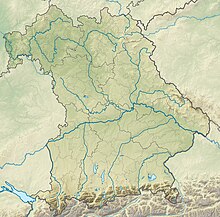
Back Битка при Елхинген Bulgarian Batalla d'Elchingen Catalan Bitva u Elchingenu Czech Schlacht bei Elchingen German Bataille d'Elchingen French Battaglia di Elchingen Italian ელხინგენის ბრძოლა Georgian Slag bij Elchingen Dutch Batalha de Elchingen Portuguese Bătălia de la Elchingen Romanian
| Battle of Elchingen | |||||||
|---|---|---|---|---|---|---|---|
| Part of the War of the Third Coalition | |||||||
 Battle of Elchingen from an engraving by Johann Lorenz Rugendas. French infantry storm the abbey while dragoons chase fleeing Austrians. | |||||||
| |||||||
| Belligerents | |||||||
|
|
| ||||||
| Commanders and leaders | |||||||
|
|
| ||||||
| Units involved | |||||||
| VI Corps (Grande Armée) | Riesch's Corps | ||||||
| Strength | |||||||
| 17,000 | 16,000 | ||||||
| Casualties and losses | |||||||
| 793[1]–854[2] | 6,000[2] | ||||||
Location within Bavaria | |||||||
The Battle of Elchingen, fought on 14 October 1805, saw French forces under Michel Ney rout an Austrian corps led by Johann Sigismund Riesch. This defeat led to a large part of the Austrian army being invested in the fortress of Ulm by the army of Emperor Napoleon Bonaparte of France while other formations fled to the east. Soon afterward, the Austrians trapped in Ulm surrendered and the French mopped up most of the remaining Austrian forces, bringing the Ulm Campaign to a close.
In late September and early October 1805, Napoleon carried out a gigantic envelopment of the Austrian army in Bavaria led by Karl Mack von Lieberich. While the Austrian army lay near Ulm, south of the Danube River, the French army marched west on the north side of the river. Then Napoleon's troops crossed the river east of Ulm, cutting the Austrian retreat route to Vienna. Finally waking up to his danger, Mack tried to break out on the north side of the river, but a lone French division blocked his first attempt.
Realizing that his enemies might escape the trap, Napoleon ordered Ney to cross to the north bank of the river. Ney's larger corps attacked Riesch's corps at Elchingen on the north bank. The French captured the heights and drove the Austrian soldiers west toward Ulm, forcing many of them to surrender. While a body of Austrians remained at large on the north bank, the near destruction of Riesch's command meant that the bulk of Mack's army was hopelessly surrounded in Ulm.
- ^ Young-Chandler, 377
- ^ a b Smith 1998, p. 204.


